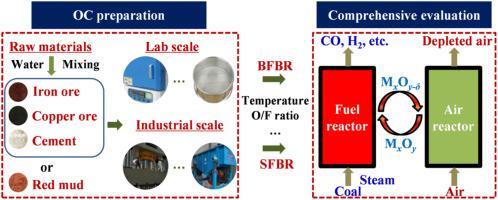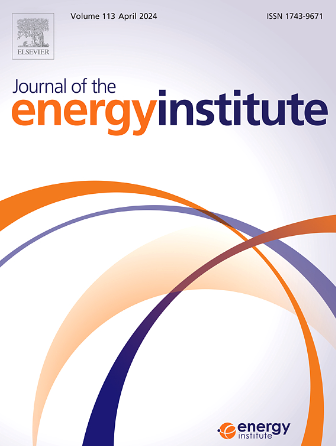Comprehensive performance investigation of inexpensive oxygen carrier in chemical looping gasification of coal
IF 5.6
2区 工程技术
Q2 ENERGY & FUELS
引用次数: 0
Abstract
Coal chemical looping gasification (CLG) using inexpensive oxygen carrier (OC) is a promising technology to obtain H2-rich syngas, and the OCs of copper/iron ore composite with an autothermal capability and red mud have been screened as the potential candidates in our previous investigation. However, the detailed synergetic effect between copper ore and iron ore, and the effect of reaction conditions on syngas production at different reactor scales are still unclear. In this work, the synergetic effect between copper ore and iron ore in composite OCs with different mixing ratios are detailedly investigated through H2 temperature-programmed reduction (TPR) tests. The results indicate that the copper ore addition can contribute the reduction of iron ore and form a new phase of CuFe2O4 between CuO in the copper ore and Fe2O3 in the iron ore, meanwhile observing the composite OC of Cu20Fe80@C generating a stronger synergetic effect in comparison to adjencent OCs. Moreover, the optimization of reaction conditions are conducted in a batch fluidized bed reactor (BFBR) by regulating the temperature, oxygen to fuel (O/F) ratio, and steam concentration for the Cu20Fe80@C and red mud OCs. It is found that a higher temperature is conducive to improving the coal conversion and syngas yield on the whole, but not the H2-rich syngas production. While a lower O/F ratio favors the preparation of H2-rich syngas, and the optimal steam concentration is determined as 50 vol% for both OCs under comprehensive consideration of gasification time, syngas yield and heating cost. Additionally, the copper/iron ore composite OC with excellent CLG performance and bed stability is further confirmed in a semi-continuous fluidized bed reactor (SFBR), which shows the effects of temperature and O/F ratio on syngas production similar to those in BFBR. In summary, the promising copper/iron ore composite OC exhibits good adjustability and adaptability for CLG process in terms of reaction conditions and reactor scales, respectively.

煤化学循环气化中廉价氧载体的综合性能研究
使用廉价的氧载体(OC)进行煤化学循环气化(CLG)是一种获得富含 H2- 合成气的有前途的技术。然而,铜矿与铁矿之间的详细协同效应以及不同反应器规模下反应条件对合成气产量的影响仍不清楚。本研究通过 H2 温度编程还原(TPR)试验详细研究了铜矿石和铁矿石在不同混合比的复合 OC 中的协同效应。结果表明,铜矿石的加入可以促进铁矿石的还原,并在铜矿石中的 CuO 和铁矿石中的 Fe2O3 之间形成新的 CuFe2O4 相,同时观察到 Cu20Fe80@C 的复合 OC 与邻近的 OC 相比产生了更强的协同效应。此外,在间歇式流化床反应器(BFBR)中,通过调节 Cu20Fe80@C 和赤泥 OC 的温度、氧/燃料(O/F)比和蒸汽浓度,对反应条件进行了优化。研究发现,较高的温度有利于提高煤炭转化率和合成气产量,但不利于提高富含 H2- 的合成气产量。在综合考虑气化时间、合成气产量和加热成本的情况下,两种 OC 的最佳蒸汽浓度均为 50vol%。此外,在半连续流化床反应器(SFBR)中进一步证实了铜/铁矿石复合 OC 具有优异的 CLG 性能和床层稳定性,其温度和 O/F 比对合成气产量的影响与 BFBR 相似。总之,前景广阔的铜/铁矿石复合 OC 在反应条件和反应器规模方面分别表现出良好的可调性和适应性,适用于 CLG 工艺。
本文章由计算机程序翻译,如有差异,请以英文原文为准。
求助全文
约1分钟内获得全文
求助全文
来源期刊

Journal of The Energy Institute
工程技术-能源与燃料
CiteScore
10.60
自引率
5.30%
发文量
166
审稿时长
16 days
期刊介绍:
The Journal of the Energy Institute provides peer reviewed coverage of original high quality research on energy, engineering and technology.The coverage is broad and the main areas of interest include:
Combustion engineering and associated technologies; process heating; power generation; engines and propulsion; emissions and environmental pollution control; clean coal technologies; carbon abatement technologies
Emissions and environmental pollution control; safety and hazards;
Clean coal technologies; carbon abatement technologies, including carbon capture and storage, CCS;
Petroleum engineering and fuel quality, including storage and transport
Alternative energy sources; biomass utilisation and biomass conversion technologies; energy from waste, incineration and recycling
Energy conversion, energy recovery and energy efficiency; space heating, fuel cells, heat pumps and cooling systems
Energy storage
The journal''s coverage reflects changes in energy technology that result from the transition to more efficient energy production and end use together with reduced carbon emission.
 求助内容:
求助内容: 应助结果提醒方式:
应助结果提醒方式:


